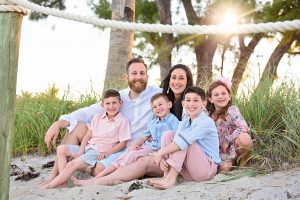Dr. Mell said his older children ask a lot of scientific questions such as, “Why can’t we use radiation?” and “Did you intubate any patients last night?” while his younger children are more concerned with whether they’re allowed to hug him when he gets home from work.
Explore This Issue
ACEP Now: Vol 39 – No 05 – May 2020In Dr. Shenvi’s household, her husband is in the middle of treatment for a brain tumor, so their children are already accustomed to having honest conversations about mortality. That groundwork probably made the COVID-19 discussions easier, Dr. Shenvi said. “I think it’s less important what we say and more important how we are acting, because [our children] will take their cues from us,” she said. She and her husband are staying calm and trying to maintain normalcy. “We’re not, you know, hoarding toilet paper,” she joked.
Dr. Gotlib and his wife, a home care nurse who is also working a lot during this crisis, are seeing their kids’ personalities react very differently to the stress of a global pandemic. His 8-year-old daughter is completely unfazed, while her twin brother is a different story.
“He asks me every day what my shift is. He wants to know when I’m leaving, and when I’m coming back. He wants to know if I’m on an 8, 10, or 12,” Dr. Gotlib said. “It worries me how he’s taking it, because he seems to be getting more introverted and anxious as this [crisis] progresses. We do our best, but when we’re solo [parenting] whenever we’re home, it makes it hard to focus. We try to reassure him the most that everything is fine, that mom and dad are safe, that we’ll always be there for him. We try and avoid having work conversations when he’s around.”
The Gotlibs also have a 10-year old son who is deeply curious about his parents’ role as health care workers during this pandemic. “He’s a really emotional kid, and he gives me big hugs every night,” Dr. Gotlib said. “I don’t think he realizes those hugs support me as much as they support him.”
When in Doubt, Demonstrate
For many kids, seeing is believing. When it comes to quelling COVID-19 fears, many emergency physician parents deployed a similar teaching tactic: They brought out the personal protective equipment (PPE). They donned and doffed, showed their kids the various masks and goggles, explained how each piece worked, and walked the children through the post-shift decontamination process.
Pages: 1 2 3 4 5 | Single Page







No Responses to “Emergency Physician Parents Share How They’re Managing the COVID-19 Crisis”